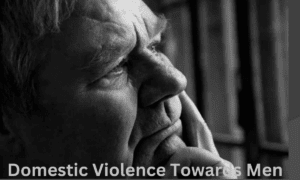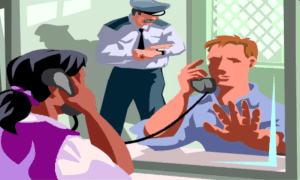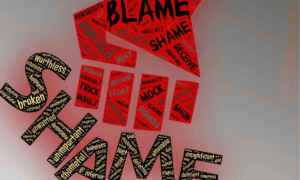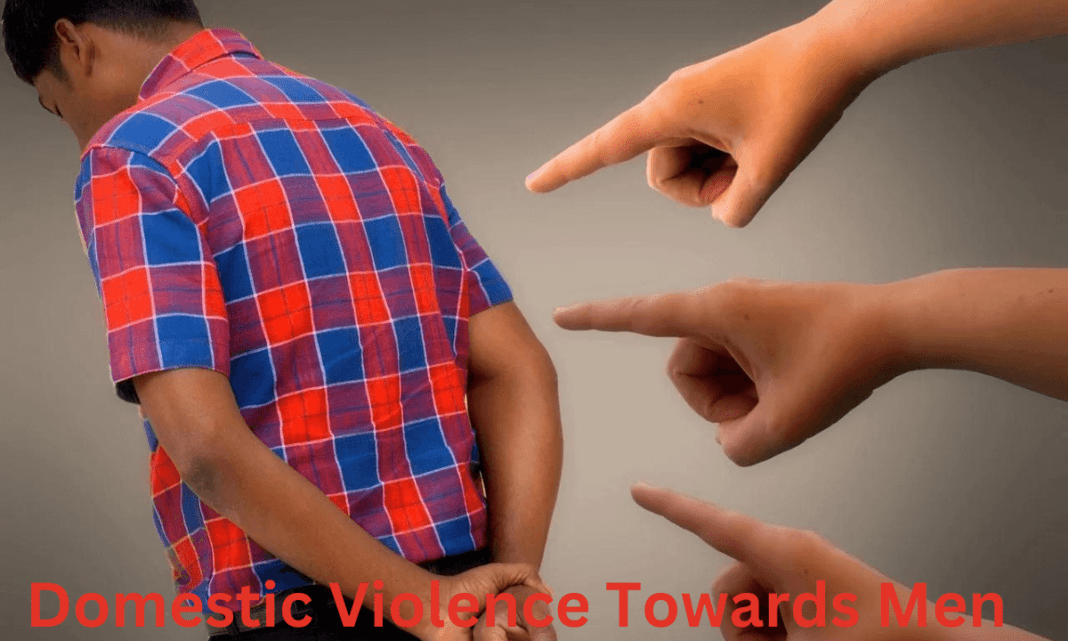Domestic Violence Towards Men: Men Who Are Victims of Domestic Abuse

When men are physically or verbally abused inside the context of their home,such as in a marriage or cohabitation, this is known as domestic violence towards men. Similar to how laws differ between jurisdictions regarding domestic abuse against women, laws regarding violence against men can also be considered a crime. Another barrier that men may face when trying to report IPV is that society does not typically acknowledge it as much as IPV against women.
How Does Domestic Violence Towards Men Affect Their Lives?
Domestic violence is more common among women and results in more injuries and fatalities than males. However, men are less likely to disclose this crime to the authorities. There are several obstacles that men who come forward to report domestic violence may encounter.
These include societal stigmatization due to their perceived lack of masculinity, the worry that authorities will not believe them, and the possibility of being wrongfully accused of being the abuser. There is a global problem with the underreporting of domestic abuse, which affects both men and women.
Challenges With Estimation
Regardless of gender, statistics show that intimate partner violence is innately plagued by under-reporting. Intimate partner violence rates (against men and women) have been consistently higher in supplementary studies conducted between 2001 and 2004 than in the typical crime surveys.
Among victims of intimate partner abuse, 27% of women went to the police, compared to 10% of males; additionally, 44% of women went to a professional organization, while only 19% of men did the same.
These statistics are from a report that was conducted in 2010 and 2011. At the same time, 82.1% of women report domestic abuse to the police, and 97.2% of men do not, according to the Australian Bureau of Statistics.
The National Crime Council in the Republic of Ireland conducted a study in 2005 and found that 29% of women who had been victims of violence had reported it to the authorities. In contrast, only 5% of men had done so.
Instead of universally condemning men’s aggressiveness against women, researchers have shown that there is some social and cultural support for women’s aggressiveness against men.
Research shows that intimate partner violence between men is more likely to result in severe injuries and a heightened state of terror compared to violence between women. Because of this, males may not see themselves as victims of IPV or may not understand that it is a crime.
Conversely, a large number of violent males are quick to assume the role of the victim. One person who frequently used the term “battered husband” to describe himself was O. J. Simpson. Victims of intimate partner violence run the risk of coming out as abusers if they come forward and report the incident.
Not Disclosing


Some men are afraid that the police will accuse them of being abusers and arrest them if they go to the police. The assumption that the woman was acting in self-defence or retaliation for abuse could cause some male victims to feel unsafe approaching others.
Less than 20% of male victims will report the incident to authorities or a healthcare provider, according to surveys. Reasonable concerns that these authorities will treat them with contempt, ridicule, or disbelief may be the root of this.
University of Cumbria researcher Dr Elizabeth Bates recently published a study revealing that male victims of intimate partner violence often felt unbelieved and laughed at, even by the police.
Some men may choose not to disclose domestic abuse to the authorities for fear of retaliation from their partners, which could manifest in a variety of ways, including troubles at work. Another challenge for male victims of violence is that they are not the ones doing the violent act but rather the ones being victimized.
Victimization Estimates For Males.
There might be too much technical information here that only a select few will find interesting. To help, please separate or move any pertinent content and remove any unnecessary detail that would violate Wikipedia’s inclusion policy. In September 2023
Results from the 1995 “Home Office Research Study 191” indicated that 4.2% of men had been victims of intimate partner violence in the preceding year, out of 10,844 persons polled (5,886 women and 4,958 men) ranging in age from 16 to 59 in England and Wales.
This number rose to 14.9% of males throughout a lifetime. In 1995, there were 6.6 million occurrences of intimate partner violence; 3.25 million of these had male victims, and 1 million of these outcomes were injuries.
The Home Office’s Crime in England and Wales reports have included a supplementary survey with more specific records since 2004.
First Impressions


Many people have a hard time believing men when they say they’ve been victims of intimate partner violence; this is compounded by the fact that “40 years of feminist tradition” assumes that women are the only victims of this type of violence and the stereotypes that men are inherently aggressive, dominant, and controlling.
Several males do not come forward or acknowledge being victims of domestic violence for several reasons, including shame, fear of judgment, and isolation.
It is difficult to gauge the extent to which this problem is prevalent because society tends to downplay and overlook this taboo subject. Male victims frequently go untreated because there aren’t enough resources for them, such as support groups and medical experts.
Modern Culture
When it comes to intimate partner violence, society tends to pay more attention to cases involving women than males.1: 2
A social experiment was conducted as part of the BBC Three show Putting It Out There. In it, a man and a woman threatened each other in the same room using identical words and body language.
It took a few seconds before someone rescued the woman, but they did this for 90 minutes. Only seven individuals tried to assist the man during the entire 90 minutes. As the woman threatened the man in the experiment, a few onlookers grinned and snapped photos.
Assistance Services
Some support agencies, particularly those dealing with children and families, fail to acknowledge the fact that men can be victims and fail to comprehend the psychological control that some men may experience as a result of their partners.
Australian victims of police brutality who sought help from support groups said they faced scorn, suspicion, and even arrests after disclosing their experiences. Another possibility is that the police will ignore their account.
Rules of Law
Research shows that the legal system often fails to recognize women who commit intimate partner violence against dominating males as victims. This is mainly because of societal stereotypes of battered women as passive and cowering, as well as gendered expectations that women should be the absolute victims.
Because female abusers of intimate partner violence are often perceived as victims by law enforcement and the courts, female attackers of male partners are more likely to evade arrest than male attackers of female partners.
Mental Health Professionals


According to psychologists, husbands are more prone to engage in psychologically abusive behaviour than spouses who do the same.
The Disparity in Social Standing
Social and cultural challenges that male victims of violence may encounter include peer judgment and questions about their manhood. Some males may be reluctant or unable to disclose they have been victims of intimate relationship abuse perpetrated by women because doing so would mean they are not conforming to the traditional gender role for men.
Fallacies Regarding Abuse Towards Men
Anyone can find it challenging to broach the subject of abuse and domestic violence. You may experience discomfort, bewilderment, humiliation, inadequacy, and loneliness. The prejudices, fears, misconceptions, and social pressures that males face make this task much more difficult. Many aspects of a man’s path to safety might be impacted by these misconceptions about abuse.
As far as anyone can tell, gender plays no role in cases of domestic violence. However, males do not appear to disclose abuse at the same rate as females. A lot of guys don’t speak up about domestic violence because they feel there’s no benefit in doing so. They think that their stories will go unbelieved forever.
Fallacies About Male Victims of Abuse (And Why They are False):
First Myth: We are led to believe that men cannot be abused.
An intimate partner has committed rape, physical assault, or stalking against one in ten men. However, when males confide in us about their experiences with abuse, we often hear that their stories are either ignored or dismissed. An intimate partner commits rape, physical assault, or stalking against 24 people every minute. There is evidence that men are also victims of violence.
Myth No. 2: We always see males in the media as violent killers, but we never see them as victims.
The article “Contribution of Media to the Normalization and Perpetuation of Domestic Violence” demonstrates how commonplace DV has grown in today’s culture. We have grown used to it and even desensitized to it, partly due to our exposure to the media.
That “chronic and repeated exposure to domestic violence is believed to cause changes in affective, cognitive, and behavioural processes” is what this study suggests. When this kind of media portrays males exclusively in a negative light, as offenders rather than victims, what then? The point is, you understand.
However, you should know that domestic violence is neither expected nor funny. We shouldn’t just roll over and pretend it’s a female problem. Yes, it also affects males.
Myth No.3, those who aren’t able to handle adversity aren’t faithful men.
Regularly, our male contacts express how abusive relationships make them feel inferior to men. Some victims have said they are too embarrassed to talk about the assault. They are afraid that they will bring the matter into the light by doing so.
The American Psychological Association claims that harmful masculinity stereotypes stigmatize “normal human emotions,” which in turn affects young men and boys. A man is less likely to come forward and report abuse if he feels shamed for doing so.
They may be reluctant to discuss their feelings and coping strategies. Everyone who has ever been abused, regardless of their sexual orientation, gender identity, or gender expression, is entitled to natural human emotions like anger, fear, and sadness. To demonstrate manhood, men need not “take it” (the abuse).
Myth No.4: Men are less likely to have access to specific resources than women.
It appears that there are more services for women than males when it comes to domestic violence, but efforts are being made to rectify this. According to the Associated Press, only the second Texas shelter catering solely to males opened its doors in October 2017. Men now have access to even more resources.
Myth No.5, the LGBTQ+ community will be embarrassed if bisexual or gay men come forward as abuse victims, contrary to popular belief.
As difficult as it is for heterosexual men to cope with abuse, homosexual and trans men have additional obstacles. Some LGBTQ+ people we talk to occasionally express fear that the LGBTQ+ community will be “shamed” if they speak out about abuse in same-sex or transgender relationships.
Many people are worried that it would spread false information or misconceptions. This has led some to believe this matter is best handled privately. Silence won’t keep you safe, as Audre Lorde memorably said. It is always worthwhile to speak out about violence and to leave an abusive relationship, regardless of one’s sexual orientation.
Barriers for People With Disabilities
The Challenge of Identifying Cases of Domestic Violence Against Males


When close friends perpetrate domestic abuse, both sides suffer. Also called intimate relationship violence. This includes psychological, sexual, physical, stalking, and threat-related violence.
Domestic abuse can harm everyone, but women are disproportionately afflicted. Domestic violence victims in men may be hard to recognize.
Abuse entails the exertion of dominance and control by one spouse over the other. Perpetrators employ derogatory language and behaviors to exert dominance in relationships. Initially.
However, that attention may become terrifying with time. On the surface, abuse may seem minor. The abusive spouse may apologize and promise to change.
Warning Signals
- The partner’s possessiveness or excessive jealousy stops them from socializing, going out with friends, or having privacy.
- She was concerned about how his partner would react to phone, text, and social media calls from other women.
- By “making fun” of him, the partner reveals intimate insights about the relationship.
- The spouse threatens suicide if he does something or refuses to do anything.
- Different people work hard to have friends visit his house or check on him.
- She was promoting her efforts to get him fired or face another “punishment” for breaking up.
Food Chains in Peril: How the Melting Ocean Floor is Changing Food Chains
Men Experiencing Domestic Violence: Identify Trends and Get Assistance
When close friends perpetrate domestic abuse, both sides suffer. Also called intimate relationship violence. This includes psychological, sexual, physical, talking, and threat-related violence.
Domestic abuse can harm everyone, but women are disproportionately afflicted. Domestic violence victims in men may be hard to recognize.
Abuse involves one spouse dominating and controlling the other. Abusers use abusive language and acts to control relationships. Abusive partners may appear compassionate, giving, and protective at first. However, that attention may become terrifying with time. On the surface, abuse may seem minor. The abusive spouse may apologize and promise to change.
Recognize the Warning Signals of Domestic Abuse
The following behaviours from your partner can indicate domestic violence:
- Degrades or labels you.
- Sometimes possessive or jealous.
- Limits on your purchasing power or finances.
- Tracks your whereabouts, online activity, and calls.
- It prevents class and work attendance.
- It prevents family visits.
- Threatens to keep you from seeing your kids.
- Has aggressive outbursts while drunk or high.
- Manages medical advice access.
- You, your family, or your pets are threatened by physical hostility or a weapon.
- Hurts you, your children, or your pets by beating, kicking, shoveling, slapping, choking, or chewing.
- It entails forcing sexual interactions.
- They blame you for marital problems or violent acts or say you deserve their abuse.
The Dark Web’s Harmful Effects on Society
People who identify as gay, bisexual, transgender, or otherwise varied may also be victims of domestic violence if their partner:


- Threatens to disclose your sexual orientation or gender identity to others in your social circle without your permission.
- Accuses you of being gay, bisexual, or transgender if you break up the relationship.
- Explains away mistreatment by claiming your sexual orientation or gender identity isn’t “real.”
- States unequivocally that the police will not assist anyone who identifies as gay, bisexual, transgender, or gender nonconforming.
- Familiarize yourself with the process.
- Among the behaviours that could be considered abusive are:
Abusers utilize violent threats.
- An abuser hurts a partner. Emotional, sexual, or bodily injury might occur.
- The abuser expresses regret and vows to make a change. An apology could include a gift or favour.
- The relationship becomes more tense, and the pattern continues.
- The violence may escalate and become more frequent over time.
- This may not be the case for you, even if it is a typical manner that domestic violence occurs.
Disavow any Responsibility
As a defence mechanism, victims of domestic violence may resort to physical or verbal aggression. During arguments, this may manifest as shouting, pushing, or hitting. The abuser may try to make you feel guilty by pointing to those behaviours as evidence that you are the abusive one. One term for this is gaslighting.
Negative habits take root in the lives of many survivors of domestic violence. One example of such conduct is the attempt to disregard or escape from a particular idea, emotion, or circumstance.
Excessive alcohol consumption or drug usage may be a problem for some individuals. Some people might decide to hurt themselves. You are not to blame or deserving of the abuse just because you engage in these practices.
Get some distance if you can’t make out what’s going on. Observe broader trends in your partnership. Examine the symptoms of domestic abuse after that. The abuser in a relationship is the one who consistently exhibits these characteristics. Abuse is occurring toward the victim.
Identify Obstacles
Assistance is necessary for anyone experiencing danger, exposure, or fear inside a relationship. Physical injury isn’t the only issue that can result from domestic abuse; it can also cause mental health issues, including anxiety, sadness, and post-traumatic stress disorder (PTSD). It can also make people more likely to abuse drugs or alcohol.
But getting assistance isn’t always a picnic. Men may be less inclined to disclose domestic abuse because of the stereotype that men are inherently stronger than women. Even in partnerships between people of the same sex, violence can occur. Men may be reluctant to seek help due to stigma, shame, and concerns that their abuse will be downplayed or ignored.
For fear of how others may see their manhood, some men choose not to disclose assault. Some male victims of male-on-male violence may be reluctant to come forward about their experiences for fear of having their sexual orientation or gender identity exposed.
Male survivors of domestic violence often face a lack of support services in their areas. Injuries sustained by males due to domestic abuse may not be immediately apparent to healthcare providers.
Because of that, it may be more difficult to disclose abuse. For other men, the fear of retaliation is too great to speak out about their abuse. You shouldn’t feel responsible if you’re a victim of abuse. Assistance is accessible.
Begin by informing someone. A close acquaintance or relative could fit the bill. Someone you trust on your healthcare team, an advocate at a domestic abuse hotline, or someone else could be this person. Discussing abuse might be difficult at first. But you can expect to feel relaxed and receive the assistance you need.
Set Up a Safeguard


It is critical to devise a strategy for your protection if you are afraid, exposed, or intimidated by your partner. Your decision to leave your partner may necessitate this strategy. A plan to escape swiftly if you are in danger is also essential. Go ahead and do this:
- If you need help or assistance, call a hotline for victims of domestic abuse. Helpline counselors can provide information about available resources. Call when your spouse is not available. Another option is to call from a friend’s or relative’s house, where you will be safer.
- Only leave home with an emergency kit. It should include spare clothing, keys, a phone charger, and eyeglasses or contact lenses if you need to leave anything behind. Put the bag somewhere secure; if you can, keep it outside your house.
- Always keep crucial personal documents, funds, and medication where you can easily access them.
- No matter what, always have a phone on you. Make sure to enter emergency numbers and essential contacts into the phone so that you may call for help immediately.
- Before you depart, figure out where you’re going and how you will get there.
- If you ever need someone to call for aid in an emergency, it’s wise to have a signal ready that you can share with a reliable family member, friend, or neighbour.
Bridging Loan: Common Pitfalls to Avoid
Take Precautions While Using the Internet.
Someone abusing you can use technology to listen in on your phone conversations, read your online messages, and even trace your movements. Obtain assistance if you feel threatened.
- Keep your information confidential by using phones with caution. Abusers might stifle or record your calls. An abuser could access your call and text history from your phone’s caller ID, cellular, or billing data. Beware of unsolicited app installations on your or your kids’ phones. Use them to be seen or recorded.
- Be careful with home computers. Abusers can install spyware on computers to track online activity and correspondence. Use a secure computer for help. Perhaps a friend’s house, library, or workplace.
- Tracking gadgets on your vehicle should be kept in mind. An abuser could potentially track your whereabouts using the GPS or other location devices installed in your car.
- Keep your email passwords up-to-date. Select passphrases that your spouse will not be able to decipher.
- Delete all sites visited on this machine. To erase all traces of webpages and images seen on your computer, follow the on-screen instructions provided by your online browser.
In writing this blog post, I aimed to provide you with more information about different social issues. Feel free to ask anything by posting a comment down below. Visit and subscribe to blogkingworld.com. Thanks




